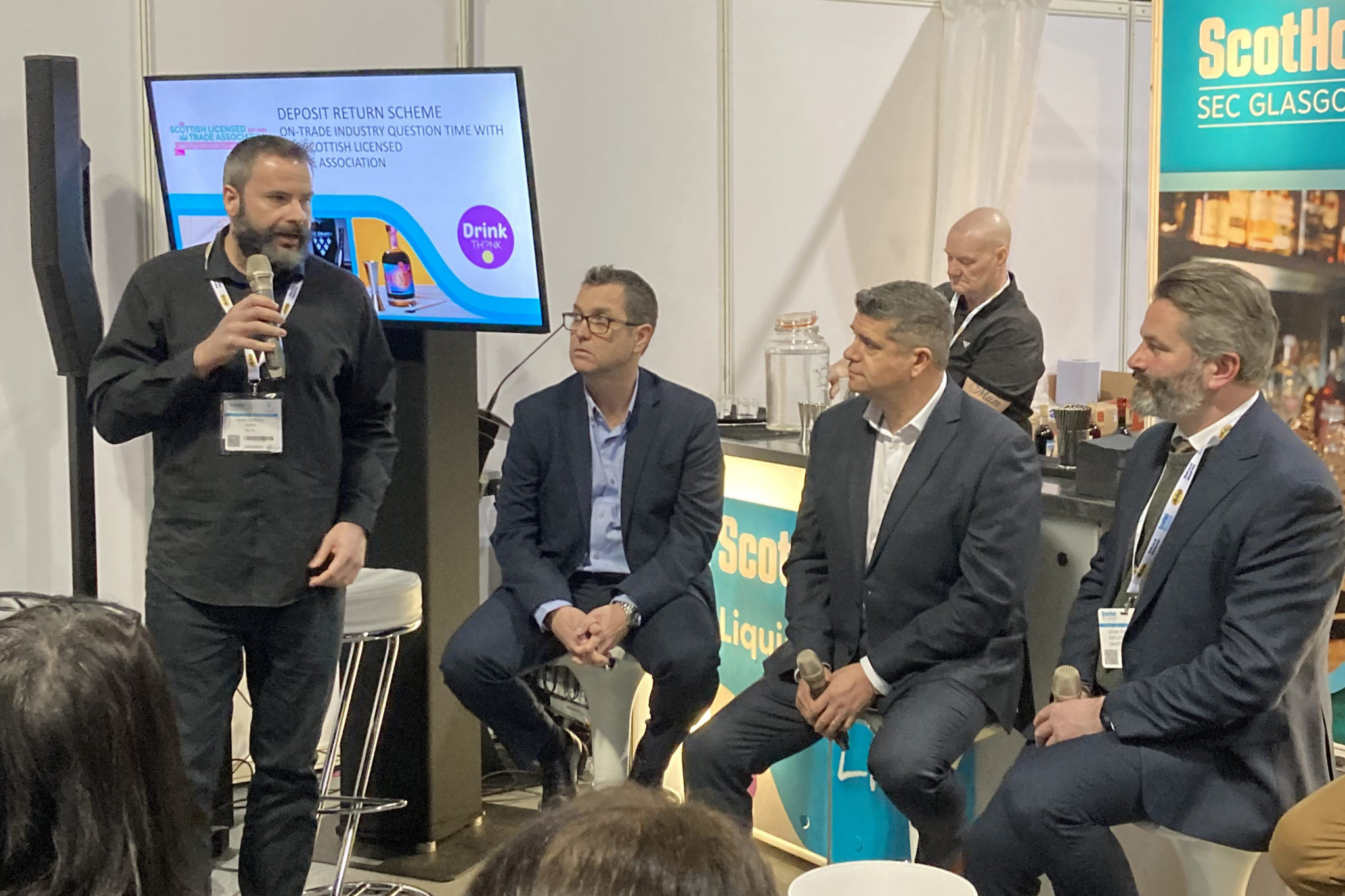
STAFF retention, rising costs and government legislation were among the hot topics discussed at SLTN’s panel during last month’s ScotHot show.
The trade show returned to Glasgow’s SEC for the first time since 2019, with more than 7000 people passing through the doors in the course of the two-day conference. Attendees were treated to a stacked programme of seminars and events as well as exhibitors from across the world of hospitality.
SLTN participated in two panel discussions at the conference.

On day one, SLTN’s Dave Hunter co-hosted a Q&A session on the upcoming Deposit Return Scheme, along with the Scottish Licensed Trade Association (SLTA).
Organised by the SLTA and Drink Think as part of its Liquid Academy Live Stage, the Q&A saw audience members able to quiz Circularity Scotland chief operating officer Simon Jones on how the scheme might impact their venues.
UK Hospitality Scotland and the Scottish Beer & Pub Association were also represented on the panel.
 Readers can view the session in its entirety on SLTN’s Facebook page, facebook.com/ ScottishLicensedTradeNews.
Readers can view the session in its entirety on SLTN’s Facebook page, facebook.com/ ScottishLicensedTradeNews.
On day two, SLTN editor Gordon Davidson and Drink Think managing director Scott Gemmell welcomed a panel of operators that included Lebowski’s owner Graham Suttle, Sian Buchan of Uno Mas in Edinburgh, Scott Murray of Cru Holdings, Buck’s Bar owner Michael Bergson and Frank Murphy of The Pot Still in Glasgow to discuss a range of issues impacting the trade.
Recruitment has been a much-discussed issue for hospitality in recent years, and one that the panellists were all keen to weigh in on.
“The senior levels is where the talent pool is really shallow,” said Murray.
“I could fill my teams tomorrow, but it wouldn’t be with the right people. And what effect does that have on the rest of the team? Does that start to drag the rest of the team down?
“So it’s a constant balancing act between getting good talent and good people and a good balance within the team as well.
“For the next couple of years that’s going to be the biggest problem we face.”
Bergson added that out of 50 CVs received for a vacancy, “two of them are going to be potential superstars”.
“It takes a long time to get 50 CVs and you’ve got to jump on them as quickly as possible,” he said.
“You’ve got to be quicker off the mark.
“You contact them there and then if you like the sound of them. And we get them in for an interview the next day and a trial shift the day after. You’ve got to be really quick.
“The other thing we believe in is you’ve got to have perpetual recruitment. So even when you’re fully staffed you’re still interviewing, because it’s all about trying to find those superstars.”
Supporting staff’s mental health was said to be more important than ever in 2023, with Buck’s Bar providing its staff with discrete access to mentoring service Progressive Pathways.
“It’s absolutely superb,” said Bergson. “Money well spent.”
Each of the panellists had their own strategies for supporting the mental health of their employees, with Suttle saying the hospitality industry has become “a shining light and example of how you look to help further people’s careers but you also look to help look after their mental health and their families”.
“That’s what a good operator does,” he said.
“Unfortunately COVID hit everybody really hard and the hangover from COVID, along with price rises and wars and all sorts of things, have just added to that pile.
“So now more than ever it’s important for hospitality operators to look after their staff, but also more importantly for the staff to realise that the stuff they’re going through, everybody is going through.”
At Uno Mas, Buchan said a healthy work/life balance has become key to retaining staff.
“I think that the days of expecting people to work 50-plus hours a week are done,” she said.
“People aren’t going to stand for it anymore. They’d rather go and drive for Amazon or work in a supermarket.
“So I think it’s really important to make sure that the staff have a decent work/life balance.”
On tackling rising costs, the panellists agreed that establishing a unique selling point can be the difference between success and failure, even as prices rise, with Bergson also pointing out that operators with several units are in a much better position to negotiate with suppliers.
And with no shortage of legislation incoming from the Scottish Government, the panel weren’t shy of criticising the raft of new laws – passed and proposed – that are filtering from Holyrood.
On the proposed ban on alcohol advertising Murphy said: “No one’s ever bought a bottle of Buckfast because they’ve seen an advert for it. People buy things because they’ve been told by their pals it’s a good idea or because they like the idea themselves. Advertising isn’t the problem.
“This morning I spoke to a bunch of my pals that work in distilleries to ask them what their split is.
“Visitor centres in distilleries that came back to me would probably see about a third of their business disappear if they weren’t allowed to sell branded merchandise.
“And that might tip the balance as to whether some visitor centres in distilleries in rural locations stay open.
“The visitor centre usually employs more people than the distillery does. So now you’re asking: are you losing jobs in remote locations for no good reason?”



















